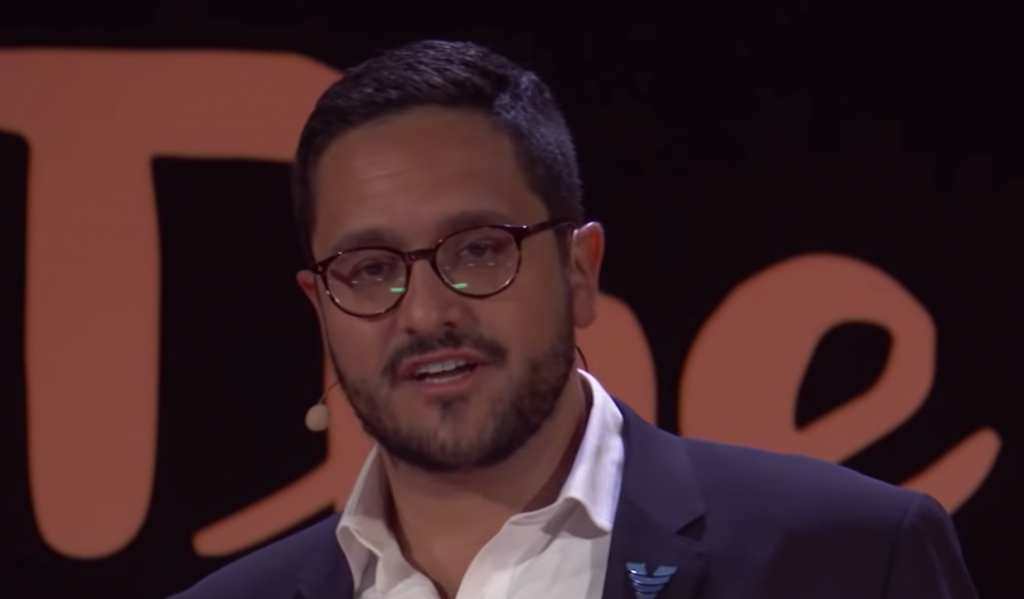
Neurosurgeon Dr. Chris Mansi, who co-founded Viz.ai to help save stroke patients, spoke about his efforts at the TEDMED conference, November 2018 in Palm Springs, CA.
New AI Developments from Detecting Covid Coughs and Strokes to Blockchain Health Records
Today we are sharing some amazing articles about some even more amazing uses of AI in our medical professions. Over the past couple of years, Seeflection.com has reported on AI reading MRIs and x-rays with more clarity than humans. We’ve reported on AI discovering tumors and cancers far sooner than has been the usual process in the past.
These three stories are from different areas of the country and varying companies.
Delvin Coldeway has a piece in techcrunch.com this week concerning COVID-19 and a better way to detect it with AI just by listening to your cough.
Cough Scrutiny
The asymptomatic spread of COVID-19 is a huge contributor to the pandemic, but of course, if there are no symptoms, how can anyone tell they should isolate or get a test? MIT research has found that hidden in the sound of coughs is a pattern that subtly, but reliably, marks a person as likely to be in the early stages of infection. It could make for a much-needed early warning system for the virus.
The sound of one’s cough can be very revealing, as doctors have known for many years. AI models have been built to detect conditions like pneumonia, asthma and even neuromuscular diseases, all of which alter how a person coughs in different ways.
Before the pandemic, researcher Brian Subirana had shown that coughs may even help predict Alzheimer’s — mirroring results from IBM research published just a week ago. More recently, Subirana thought if the AI was capable of telling so much from so little, perhaps COVID-19 might be something it could suss out as well. In fact, he isn’t the first to think so. Read more on this in the TechCrunch story.
Stroke Detection
Allentown, Pa.-based Lehigh Valley Health Network has deployed an artificial intelligence-powered tool at all of its hospitals to save clinicians time when triaging, diagnosing and treating strokes, the health system announced Oct. 29.
The software, called Viz.ai, analyzes patients’ brain scans to identify large vessel occlusion strokes and produces clear imaging, which is sent directly to the mobile devices of neurologists and interventional radiologists. It also allows the care team to consult with each other on the best course of action in real-time, using a HIPAA-compliant mobile interface similar to texting.
“It’s truly revolutionizing care,” Yevgeniy Isayev, MD, a Lehigh Valley Health Network neurologist, said in a news release. “With stroke care, every minute counts in saving a person’s brain, and Viz.ai estimates that this streamlined communication saves care teams an average of 20 minutes.”
Viz.ai was rated among the 50 most promising AI companies by Forbes magazine.
read more at beckershospitalreview
Safe Islands Blockchain Health Passport
A Canadian digital identity firm is empowering a safer recovery for event venues on the Las Vegas Strip through its secure blockchain health passport and data network. At the 1D Network Inc. (1D Network) launch at MGM’s Las Vegas’s Mandalay Bay resort, members of the USA events industry were given demonstrations of the company’s technologies.
Data on the 1D Network is transformed into secure credential tokens which are automatically authenticated on the network, and individuals control access to their data through a scannable QR-code pass.
So essentially you sign up for this event, you get tested, and then you and your health status are verified if you go to other venues in the ‘safe island’ area.
The result is a “Safe Island” – a zone of enhanced health safety and monitoring. The solution was designed to support the recovery of sectors like aviation and live events, including the $10B Las Vegas conferences industry.
1D Network’s CEO, Alexis Pappas, said that Safe Islands was developed to empower both organizations and individuals.
“There is an urgent need to transform how industries manage identity, health and credentials, and technologies like the 1D Pass put control over personal data back where it belongs – in the hands of the individual who owns it.”
read more at aithority.com







Leave A Comment